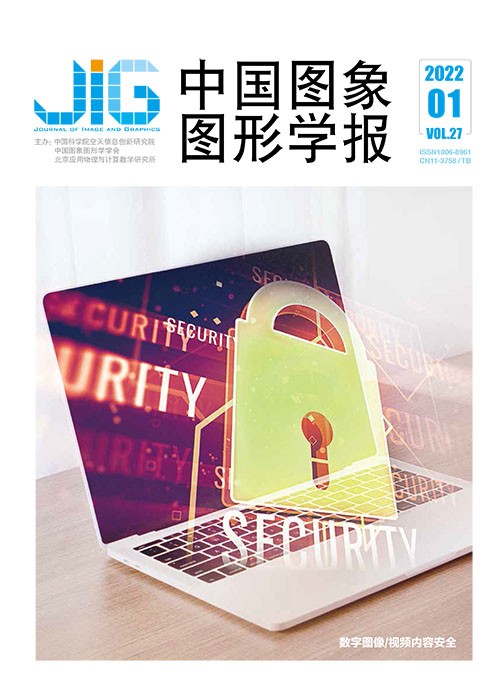
无损载体和鲁棒代价结合的JPEG图像鲁棒隐写
摘 要
目的 传统隐写技术在实际社交网络信道上难以保护秘密信息的完整性。在社交网络中,图像往往经过有损压缩信道进行传输,从而导致隐蔽通信失效。为了保证经过压缩信道传输的载密图像鲁棒性,设计安全鲁棒的隐蔽通信技术具有实际应用价值。基于最小化图像信息损失,本文提出无损载体和鲁棒代价结合的JPEG图像鲁棒隐写。方法 首先,指出构造无损载体能有效维持隐写安全性和鲁棒性的平衡,对经过压缩信道前后的JPEG图像空域像素块进行差分,构造无损载体以确定鲁棒嵌入域;其次,通过对离散余弦变换(discrete cosine transform,DCT)系数进行“±1”操作,并计算空域信息在压缩传输前后的损失,设计衡量DCT系数抗压缩性能的鲁棒代价;同时,验证在低质量因子压缩信道下鲁棒代价更能区分DCT系数的鲁棒能力,最后,利用校验子格编码(syndrome-trellis code,STC),结合无损载体和鲁棒代价对秘密信息进行嵌入。结果 实验在BossBase1.01图像库上进行对比实验,相比于传统JPEG隐写技术,构造无损载体作为嵌入域能有效地将信息平均提取错误率降低24.97%,图像的正确提取成功率提高了21.35%;在此基础上,鲁棒代价进一步将信息平均提取错误率降低1.05%,将图像的正确提取成功率提高16.12%,验证了本文方法显著提高了隐写抗压缩性能。与J-UNIWARD (JPEG universal wavelet relative distortion)、JCRISBE (JPEG compression resistant solution with BCH code)和AutoEncoder (autoencoder and adaptive BCH encoding)3种现有典型隐写方法相比,提出的方法信息平均提取错误率分别降低了95.78%、93.17%和87.38%,图像的正确提取成功率为另外3种隐写方法的86.69倍、30.74倍和4.13倍。图像视觉质量逼近传统隐写方法,并保持较好的抗检测性。结论 本文提出的抗低质量因子JPEG压缩鲁棒隐写方法,获得的中间图像在经过压缩信道后,具有较强的抗压缩性和抗检测性,并保持较高的图像质量。
关键词
Robust JPEG steganography based on lossless carrier and robust cost
Yin Xiaolin1, Lu Wei1, Zhang Junhong1, Luo Xiangyang2(1.School of Computer Science and Engineering, Sun Yat-sen University, Guangzhou 510006, China;2.PLA Strategic Support Force Information Engineering University, Zhengzhou 450001, China) Abstract
Objective A huge amount of digital images are transmitted via new media online. In order to reduce the storage cost, initial digital images processing is conducted and, transmitted via the lossy compression channels. Based on original steganography scheme, it is often unable to extract the correct embedded secret messages from the transmitted compressed stego image completely when a stego image is transmitted via the lossy compression channel. The information loss leads to the failure of covert communication. The previous steganography method ignores the robustness performance, and the integrity of secret messages is difficult to be persistent. As an extension of branch of data hiding, some robust watermarking methods cannot ensure that the embedded watermark is extracted entirely. In order to achieve the robustness of the embedded watermark, the size of a watermark is often smaller than the size of secret messages in image steganography. In addition, the robust watermarking schemes ignore the anti-detection performance which decreases the statistical security in common. Hence, a secure and robust JPEG steganography technology is required in practice to ensure the robustness of the transmitted compressed stego images and protect the integrity of secret messages. A challenge to illustrate a robust steganography algorithm with strong anti-compression performance, strong anti-detection performance and high imperceptibility of stego images need to be dealt with. To minimize the loss of image information, a robust steganography algorithm for JPEG image based on the lossless carrier construction and the robust cost design is proposed.Method First, the relevance between security and robustness in steganography is analyzed and demonstrated. The current robust steganography methods utilize syndrome-trellis code (STC) to improve the security of stego image as usual. The amount of modified pixels is decreased via minimizing the distortion. To avoid the influence of error diffusion caused by STC, the presentation of the modified DCT coefficients should be stable excluding other modified coefficients. By constructing the lossless carrier, the balance between security and robustness can be effectively maintained. After differentiating the spatial blocks of a compressed JPEG image processing in the lossy channel, the lossless carrier can be acquired as the robust embedding domain. Next, the distortion minimization in STC is transformed into the minimization of image information loss. By calculating the spatial information loss with a secret bit embedding, a robust cost is designed to measure the anti-compression performance of each DCT coefficient. And the robust cost can efficiently distinguish the robustness of DCT coefficients in lossy compression channels with lower quality factors. At last, STC is utilized to embed secret messages in relation to lossless carrier and robust cost, and an intermediate image is generated. The transmitted compressed stego image maintains high visual quality and strong anti-detection via the lossy compression channel. The secret messages can resist JPEG compression and can be extracted in the right way.Result The experiments are conducted via comparing with the conventional JPEG steganography and the common robust steganography on BossBase1.01 image database. Compared with traditional JPEG steganography, the proposed lossless carrier construction as the embedding domain can effectively reduce the average error rate of secret messages extraction by 24.97%, and improve the average success rate of stego images by 21.35%. The robust cost can further reduce the average error rate of secret messages extraction by 1.05%, and improve the average success rate of stego images by 16.12%, which demonstrates the improved anti-compression performance intensively. Compared with other steganography schemes, the average error rate of secret message extraction is decreased by 95.78%, 93.17%, and 87.38%, respectively. And the average success rate of stego images extraction is 86.69 times, 30.74 times and 4.13 times of other three compared steganography methods. The visual qualities of intermediate images and transmitted compressed stego images keep close to that of the original steganography scheme. In the lossy compression channels with quality factors 50, 60, and 70, the visual qualities of the intermediate images generated by the proposed method are all above 55 dB, and the visual qualities of the transmitted compressed stego images are all above 50 dB. The anti-detection performance is qualified.Conclusion The illustrated steganography method can resist JPEG compression with a low-quality factor and high compression rate. The lossless carrier construction and robust cost design are analyzed and verified for good robustness performance via minimizing the spatial information loss of stego images.
Keywords
|



 中国图象图形学报 │ 京ICP备05080539号-4 │ 本系统由
中国图象图形学报 │ 京ICP备05080539号-4 │ 本系统由